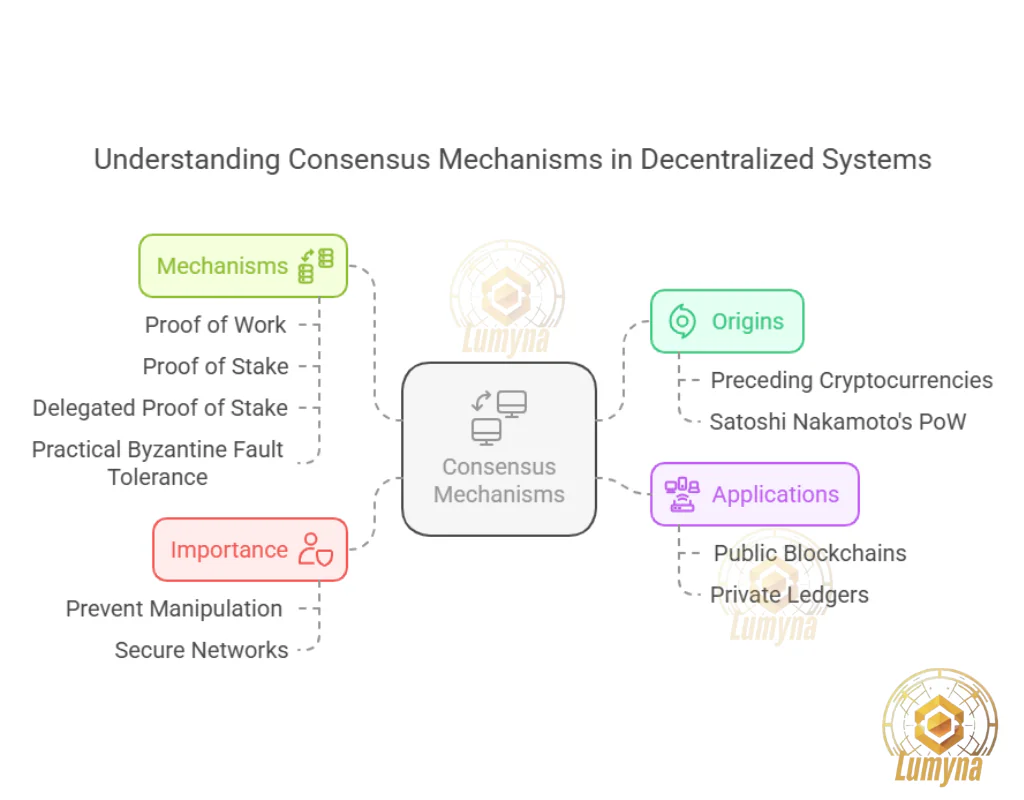
What are consensus mechanisms?
Consensus mechanisms are protocols used in decentralized systems, like blockchains or distributed ledgers, to ensure all participants (nodes) agree on the validity of transactions or data without a central authority. They maintain trust, security, and consistency across a network by resolving conflicts and preventing fraud, such as double-spending in cryptocurrencies. These mechanisms are critical to the operation of decentralized technologies, enabling them to function reliably in the absence of a trusted intermediary.
Who created consensus mechanisms?
The concept predates cryptocurrencies, rooted in distributed computing research, but Satoshi Nakamoto formalized the first widely adopted mechanism, Proof of Work (PoW), with Bitcoin in 2009. Nakamoto’s innovation inspired subsequent mechanisms like Proof of Stake (PoS), developed by figures like Sunny King and Scott Nadal (Peercoin, 2012), and others by blockchain developers aiming to improve efficiency, scalability, or security.
When are consensus mechanisms used?
They operate continuously in decentralized networks, activating whenever new data (e.g., a transaction) needs validation. In Bitcoin, this happens roughly every 10 minutes as blocks are added; in faster networks like Ethereum (post-2022 PoS shift), it’s seconds. They’re essential 24/7 in any system requiring agreement among untrusted parties, from crypto to decentralized apps (dApps).
Where are consensus mechanisms applied?
They’re used in public blockchains (Bitcoin, Ethereum), private ledgers (Hyperledger), and hybrid systems globally. Any network of nodes—whether run by miners, validators, or organizations—employs them to synchronize data across geographic and jurisdictional boundaries, making them integral to digital ecosystems worldwide.
Why are consensus mechanisms important?
They ensure decentralization works by replacing centralized control with a system where participants collectively verify truth. They prevent manipulation, secure the network against attacks (e.g., 51% attacks in PoW), and maintain an immutable record. Without them, trustless systems would collapse, as there’d be no way to agree on what’s legitimate, undermining their core value.
How do consensus mechanisms work?
Each mechanism has a unique process, but the goal is the same: consensus. In Proof of Work (PoW), nodes (miners) compete to solve complex math puzzles; the first to succeed adds a block and earns a reward (e.g., Bitcoin). It’s energy-intensive but secure. Proof of Stake (PoS) has validators stake their crypto to propose or validate blocks—less energy-hungry, used by Ethereum since 2022. Delegated Proof of Stake (DPoS) (e.g., EOS) lets users vote for delegates to validate, boosting speed. Practical Byzantine Fault Tolerance (PBFT) suits private networks, tolerating some dishonest nodes via voting. Each balances trade-offs like speed, security, and decentralization.
Related Questions:
- Which mechanism is the best? It depends—PoW is most secure but slow; PoS is efficient but less battle-tested; DPoS is fast but less decentralized.
- What’s an example of a consensus mechanism? PoW in Bitcoin, where miners race to hash blocks, securing the network.
- Can they fail? Yes, if attackers control enough resources (e.g., 51% of PoW hash power) or if participation drops, weakening consensus.
- How do they impact energy use? PoW consumes vast electricity (e.g., Bitcoin’s grid-scale usage); PoS and others are greener, addressing environmental concerns.




